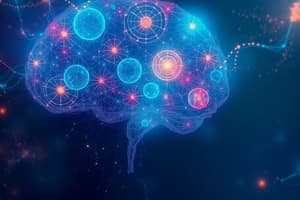Podcast
Questions and Answers
What is the primary function of memory?
What is the primary function of memory?
- To focus thoughts on immediate tasks
- To enhance sensory input
- To encode, store, and retrieve information (correct)
- To eliminate unnecessary information
How long does short-term memory typically retain information?
How long does short-term memory typically retain information?
- About 20-30 seconds (correct)
- A few seconds
- Several days
- A few hours
Which type of memory includes visual and auditory inputs?
Which type of memory includes visual and auditory inputs?
- Short-Term Memory
- Working Memory
- Sensory Memory (correct)
- Long-Term Memory
What is the purpose of chunking in memory?
What is the purpose of chunking in memory?
Which factor can negatively impact memory retrieval?
Which factor can negatively impact memory retrieval?
What is anterograde amnesia primarily characterized by?
What is anterograde amnesia primarily characterized by?
Which memory stage involves transforming sensory input into a usable form?
Which memory stage involves transforming sensory input into a usable form?
What is motivated forgetting an example of?
What is motivated forgetting an example of?
Flashcards are hidden until you start studying
Study Notes
Definition of Memory
- Memory is the mental capacity to encode, store, and retrieve information.
Types of Memory
-
Sensory Memory
- Brief, initial recording of sensory information.
- Lasts milliseconds to seconds.
- Examples: iconic (visual) memory, echoic (auditory) memory.
-
Short-Term Memory (STM)
- Temporarily holds information for about 20-30 seconds.
- Limited capacity (typically 7 ± 2 items).
- Useful for immediate tasks and problem-solving.
-
Long-Term Memory (LTM)
- Stores vast amounts of information for extended periods.
- Can be explicit (declarative) or implicit (procedural).
Stages of Memory
-
Encoding
- Process of transforming sensory input into a form usable by the brain.
- Involves attention and can be enhanced through techniques like elaboration and mnemonics.
-
Storage
- Maintaining information over time.
- Involves consolidation, where memories are stabilized.
- Can be affected by factors such as sleep and emotional states.
-
Retrieval
- Accessing stored information.
- Can be influenced by cues and context.
- Types: recall (retrieving information without cues) and recognition (identifying previously learned information).
Factors Affecting Memory
- Rehearsal: Repeating information to enhance storage.
- Chunking: Grouping information into larger units for easier recall.
- Interference: New information can disrupt the recall of old information (proactive and retroactive interference).
- Context: Environmental cues can enhance retrieval.
- Emotion: Strong emotional experiences can lead to better memory retention.
Theories of Forgetting
- Decayed Memory: Information fades over time if not accessed.
- Interference Theory: Other memories disrupt retrieval.
- Motivated Forgetting: Deliberate suppression of memories.
Memory Disorders
-
Amnesia: Loss of memory due to brain injury or psychological trauma.
- Anterograde (inability to form new memories).
- Retrograde (inability to retrieve old memories).
-
Dementia: Progressive decline in cognitive function, affecting memory and other skills.
Techniques to Improve Memory
- Mnemonic Devices: Tools like acronyms or rhymes to assist memory.
- Visualization: Creating mental images to strengthen recall.
- Spaced Repetition: Reviewing information over increasing intervals to enhance retention.
- Healthy Lifestyle: Regular exercise, adequate sleep, and proper nutrition support memory functions.
Definition of Memory
- Memory encompasses encoding, storing, and retrieving information within the mind.
Types of Memory
-
Sensory Memory:
- Captures sensory information for brief moments, lasting milliseconds to seconds.
- Includes iconic memory (visual) and echoic memory (auditory).
-
Short-Term Memory (STM):
- Retains information temporarily for approximately 20-30 seconds.
- Has a limited capacity, typically holding 7 ± 2 items.
- Facilitates immediate tasks and problem-solving efforts.
-
Long-Term Memory (LTM):
- Capable of storing extensive amounts of information for long durations.
- Divided into explicit (declarative) and implicit (procedural) memory types.
Stages of Memory
-
Encoding:
- Transforms sensory input into usable information for the brain.
- Attention and techniques like elaboration and mnemonics enhance this process.
-
Storage:
- Involves maintaining information over time, with consolidation stabilizing memories.
- Various factors, including sleep and emotional states, can influence this stage.
-
Retrieval:
- Accessing stored information, influenced by environmental cues and context.
- Includes two types: recall (retrieving without cues) and recognition (identifying learned information).
Factors Affecting Memory
-
Rehearsal:
- Repetition of information to improve storage of memories.
-
Chunking:
- Grouping information into manageable units for better recall.
-
Interference:
- Occurs when new information hinders the retrieval of older memories (proactive and retroactive interference).
-
Context:
- Environmental cues that can facilitate memory retrieval.
-
Emotion:
- Strong emotional experiences contribute to improved memory retention.
Theories of Forgetting
-
Decayed Memory:
- Memories fade if not accessed over time.
-
Interference Theory:
- Suggests other memories can disrupt the process of retrieval.
-
Motivated Forgetting:
- Involves the intentional suppression of certain memories.
Memory Disorders
-
Amnesia:
- Characterized by memory loss resulting from brain injury or psychological trauma.
- Includes anterograde amnesia (difficulty forming new memories) and retrograde amnesia (difficulty retrieving old memories).
-
Dementia:
- A progressive decline in cognitive abilities impacting memory and other functions.
Techniques to Improve Memory
-
Mnemonic Devices:
- Techniques such as acronyms or rhymes that aid in memory retention.
-
Visualization:
- Forming mental images to strengthen recall capabilities.
-
Spaced Repetition:
- Reviewing information at spaced intervals to bolster retention.
-
Healthy Lifestyle:
- Regular exercise, sufficient sleep, and balanced nutrition can enhance memory function.
Studying That Suits You
Use AI to generate personalized quizzes and flashcards to suit your learning preferences.




